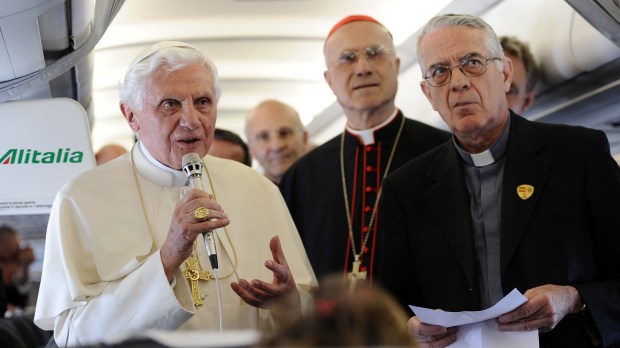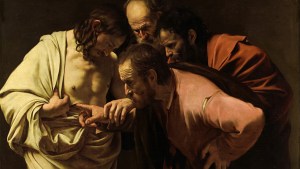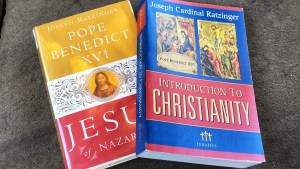On the morning of December 31, 2022, at the age of 95, Pope Emeritus Benedict XVI passed away at his residence in the Mater Ecclesiae monastery, in the heart of the Vatican Gardens. A Mass in his memory will be celebrated this Sunday, December 31, 2023, at 8am in St. Peter’s Basilica, presided over by his former secretary, Archbishop Georg Gänswein, who has returned from Germany for the occasion.
Fr. Federico Lombardi was the director of the Vatican press office for the last seven years of Benedict XVI’s pontificate, and continued in the post for three years under Pope Francis. In 2016, he became the president of the Ratzinger Foundation, which keeps alive the intellectual legacy of the German pontiff and theologian. On the occasion of a series of meetings organized at the Vatican around the theme “The life, thought, and legacy of Benedict XVI, a year after his death,” Father Lombardi talks to I.MEDIA about his memories of the pope emeritus and his approach to death.
What is your last personal memory of Pope Benedict?
Fr. Federico Lombardi: I last met him on the afternoon of December 1, 2022, with the Ratzinger Prize winners. I was surprised that he agreed to this visit, as he was very tired, but he wanted to respect this tradition. We spent half an hour in conversation with the French Jesuit Michel Fédou and the American jurist Joseph Weiler, whom Benedict XVI had once known well.
He had difficulty speaking, but showed his interest and curiosity by asking precise questions with the help of his secretary Mgr Gänswein, who acted as interpreter. It was a very affectionate dialogue, which led to the last known photo of the Pope Emeritus, 30 days before his death. It had been known for several years that his frailty could lead to his passing, but his end of life came relatively unexpectedly and swiftly.
Could we say that the way he died was, in a way, the final signature of his work, of his theology and his love for God?
Fr. Lombardi: I’m convinced of it! Benedict XVI always tackled with great courage and lucidity the question of death, of eschatology, which has been somewhat neglected by contemporary theologians. It’s a characteristic theme of his theological reflection, linked to a personal spirituality built around the idea of encountering God, of his desire to see the face of the Lord.
It’s a thread that links his whole life, his whole spirituality. He lived this preparation for the encounter with God with lucidity, in faith, but also in awareness of the mystery. He has always said that his theological research and his reading of the Gospels led him to recognize that this dimension seemed increasingly mysterious.
Does this dimension of the search for an Absolute relativize the image often conveyed of Joseph Ratzinger as a “conservative,” right-wing thinker, which has long given him bad press?
Fr. Lombardi: Of course, this radical search for God is not a question of right or left; it goes far beyond the traditional divide between conservatives and progressives! It’s about getting to the bottom of human existence, beyond superficial definitions.
Does Benedict XVI’s insistence on creative minorities seem prophetic today, in light of the institutional crisis facing the Church, particularly in his native Germany?
Fr. Lombardi: Indeed, he always had a clear-sighted view of his own country, due first and foremost to his experience as a priest, during which he saw the Church detach itself from its social, popular roots… He had no illusions about the possibility of Catholicism remaining a mass phenomenon, given secularization. He preferred to strengthen the roots and saw signs of vitality in groups proposing new approaches, such as Communion and Liberation in Italy. He had a close relationship with Fr. Luigi Giussani, the founder of this movement.
He also defended the faith of the people, popular devotions, especially at Marian shrines, standing up against the “intellectualism” of theologians who despise the faith lived by the working classes in a simpler, more traditional way. He spoke of the twilight of awareness of God’s presence on the horizon of our contemporary culture, seeing it as his role to speak of the God of Jesus Christ in an age that has removed him from social life.
For him, the erasure of God’s presence in the contemporary world was the first challenge he had to face. He looked for signs of renewal, through new experiences of community life and witness.
With the orientations of the Synodal Way, has the Church in Germany detached itself from its heritage?
Fr. Lombardi: These developments are in line with a trend that Benedict XVI was concerned about. His relationship with the Church in his home country, and also with the academic world, were often difficult. His conflict with Hans Küng in particular comes to mind, but this is not a unique case. Joseph Ratzinger reproached certain German theologians for their lack of ecclesial sense, with a way of thinking detached from the faith of the Church, a tendency to criticism marked by a form of self-sufficiency, detached from the institution.
For him, in order to face up to secularization the Church in Germany had to cultivate serious spiritual roots, rather than multiplying public positions on subjects outside its remit.
I remember his last speech in Freiburg im Breisgau in 2011, which was received with great perplexity by the academic and institutional world. He questioned the cumbersome nature of church bureaucracy, which was sustained by advantageous tax conditions. He expressed very direct criticism of the situation of the Church in Germany, noting positive aspects but also too much institutional red tape.
Does this critical view of an overly “self-referential” theology form a bridge with the teaching of his successor, Pope Francis, despite all their differences?
Fr. Lombardi: I think there were indeed convergences, even if Benedict XVI remained at a distance. For example, on the question of synodality, Francis was able to draw on certain reflections of his predecessor, whose great spiritual freedom he appreciated. Benedict XVI’s resignation was a clear sign of his great inner freedom. But then, each pope acts according to situations that must be understood in their specificity and diversity.
How is the Ratzinger Foundation bringing his legacy to life?
Fr. Lombardi: Certain projects have yet to be defined, but in particular we will continue to support theology, but also research into the place of the Church in contemporary culture, and the theme of “open reason” in dialogue with different disciplines. This is not limited to the study of Joseph Ratzinger’s thought alone, even though many doctoral students are interested in it.
We want to encourage a generational renewal, beyond the first circle of his disciples and “hard-core Ratzingerians.” We want to offer a service of support, a point of contact, particularly for students from Africa.
Recently, we organized a colloquium at the Gregorian to study Benedict XVI’s speeches to the world of culture, and thus make them known to new generations of young adults.



